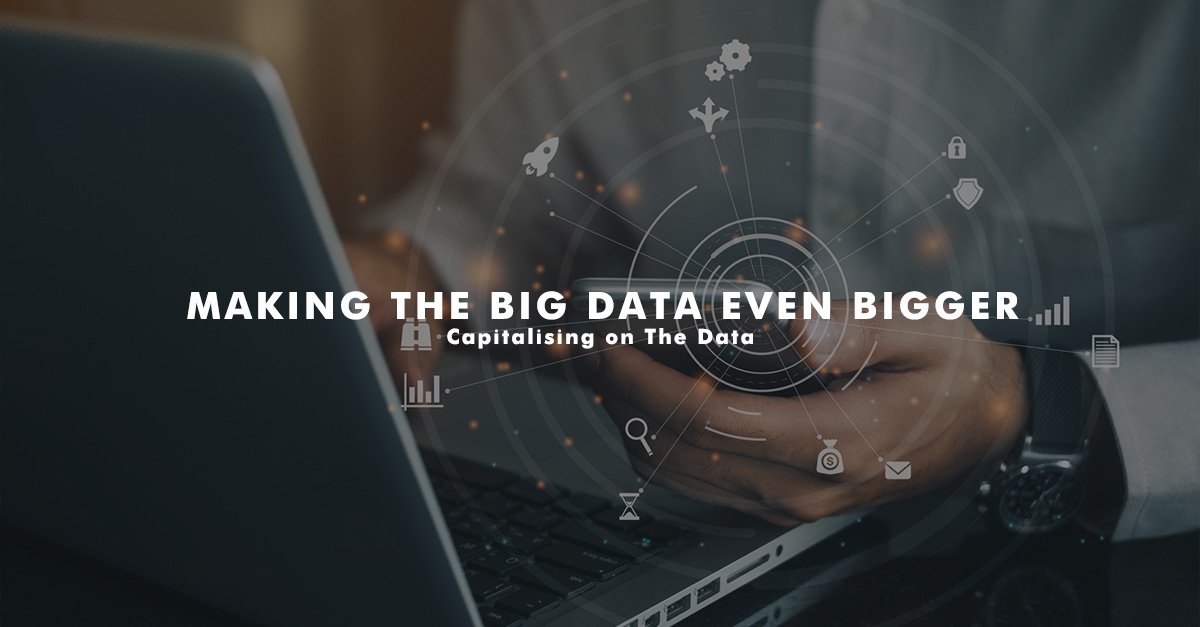
Making The Big Data Even Bigger: Capitalising On The Data
“Big Data is not only about identifying and accessing the data to make business decisions, but is also a very way to leverage on the power of data capitalising; and derive insightful decisions that flourish the businesses in the longer run.”
Data is a set of information, in a structured and unstructured format at times, which the organizations identify, access, analyze, and reach a conclusion to make business decisions.
Many businesses rely on the power of data to frame their business practice, redefine their business continuity plans, make business decisions, and flourish in the business.
The COVID-19 pandemic has made organizations feel the need to digitize their business practices and evolve with digitization unveiling the power of data.
Almost everything is data these days.
A plethora of business practices is managed and governed by data. The large data sets containing the essential aspects of the business nuances and market trends come er behavior and help businesses achieve their aims and objectives.
The essence of disruptive technologies helps you make business decisions and helps organizations access the risks, and mitigate them with risk mitigation plans.
Big Data – The Future:
Imagining the future without Big Data is like settling for something that does not exist in the first place. Big data is the core of business functions these days.
A recent survey suggests that 59% of the organizations have decided to accelerate their plans to digitize their businesses altogether. While a handful of respondents reported adapting to the hybrid digital models, digitizing a particular set of business practices.
The pandemic has provided us with challenges, but it also offered us opportunities to leverage and enhance the decision-making processes.
Another recently conducted survey reveals that 22 percent of people have been either temporarily furloughed or permanently laid off since the pandemic due to organizations’ cost commitment strategies.
Emerging technologies make big data usage with the emerging technologies such as automation, AI adoption, and the emergence of Big Data, making the most of the business decisions.
Furthermore, big data enables organizations to make decisions. It also allows them to understand the rationale of inducing its power by collaborating and merging with the big data tools; improving efficiency, and reducing turnaround time.
With the rise in data-driven business decisions, the significance of the power has increased magnanimously. The rise in data management tools, experts’ requirements, and data governance and compliance policies and regulations too; has led to the disruption of the power of data.
Elements of Big Data:
Big Data to the organizations is like cash flow to the businesses. The existence of one is not possible without the presence of the other.
Data Volume:
Nothing is denying that data is enormous; it’s large, magnificent, and yet cumbersome. It helps organizations make business decisions, but at the same time, it helps to capitalize on data and derive profits. The amount of data varies based on the industries. Almost everything is a data-driven thing these days.
Everything consists of the same power of data, from the online shopping we do to the virtual messaging we perform.
Data Ambiguities:
A large amount of data is often unstructured, all over the place, resulting in ambiguity. It makes the organizations facing difficulty in accessing it and analyzing it to derive a business decision.
The rise in digital business processes also increased data marketing processes and tools that improve data quality by discarding unnecessary and inefficient data.
Data Governance:
Governing the data is a way to enhance the quality of data and derive business decisions. The data architecture processes, data governance rules, data reengineering; and data regulations lead to scaled and effective business decision making and gaining a competitive edge over the competitors.
Making Big Data Even Bigger – Capitalising On The Data:
Any unprecedented event brings challenges and changes that are unpredictable. While such disruptions make the world face adversities and adapt to the changes; they also widen the decision-making processes of the organizations.
The decision-makers across the globe focus on the below-mentioned elements to leverage the maximum out of the Big Data.
Identifying the Right Data:
Identifying the correct data is the fundamental element in any data-related practice. Recognizing the critical areas of data management by accessing the data to arrive at the data-related conclusions helps organizations prioritize their strategic plans and reach the desired business goals and objectives.
Data Analysis:
Analysis of the data is one of the significant steps to leveraging the data to make business decisions.
The capitalising of the data analysis process follows a subset of strategies that includes integrating disruptive technologies such as artificial intelligence into decision making.
Rethinking Data Architecture:
This process comprises a comprehensive approach to analyzing data and building skills and expertise for effective decision-making, resulting in improved and revolutionized business practices. Capitalising on Big Data implements robust business practices that undertake the overall data architecture that an organization follows.
Realigning the innovative tools and business practices makes the businesses re-identify, re-emerge, and re-capitalise on the power of data.
Conclusion – Capitalising of the Data:
Data is here to stay, and leveraging on the Big Data tools is only going to flourish business practices by dealing with the current risks and threats and at the same time making them prepared for identifying the upcoming unidentified and unprecedented risks.
Just like traditional business practices suffer due to emerging unknown risks; the absence of big data tools makes data governance even tricky.
Big Data is not only about identifying and accessing the data to make business decisions; it is also a very way to leverage the power of capitalising on the data and derive insightful decisions that make organizations gain business competence and flourish in the long run.





